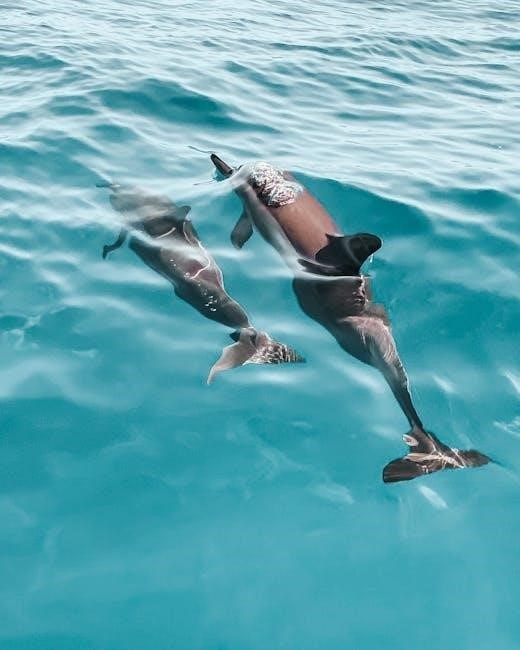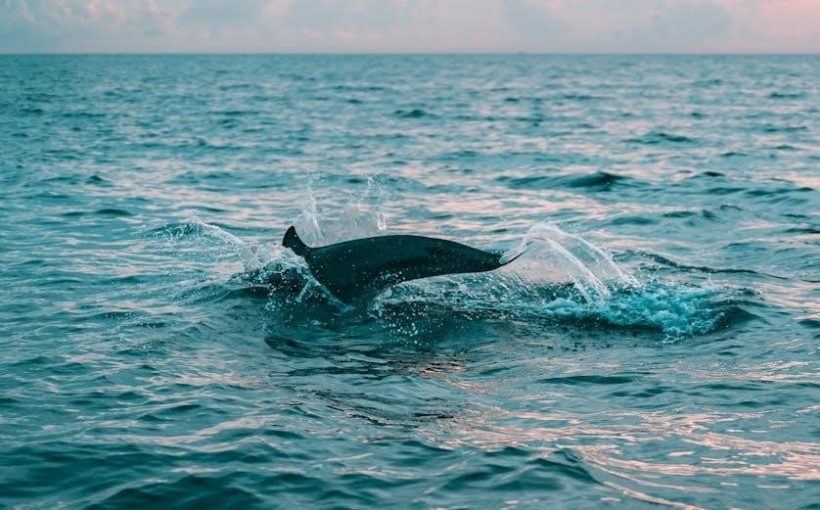The International Commission for the Conservation of Atlantic Tunas (ICCAT) is a regional fisheries management organization dedicated to conserving and managing tuna and related species. Established in 1969, ICCAT aims to ensure the sustainability of marine resources through science-based decision-making and international cooperation; Its mandate extends to protecting marine ecosystems, including addressing bycatch issues like dolphin conservation, which are critical to maintaining biodiversity and ecological balance.
1.1 Overview of ICCAT’s Mandate and Structure
ICCAT, established in 1969, operates as a regional fisheries management organization tasked with conserving Atlantic tuna and related species. Its mandate includes setting catch limits, monitoring compliance, and addressing bycatch issues like dolphin protection. Structurally, ICCAT comprises a Commission, a Scientific Committee (SCRS), and working groups. The Commission meets biennially to adopt Recommendations and Resolutions based on scientific advice. SCRS provides critical research, assessing species status and ecosystem impacts. ICCAT’s framework ensures sustainable fishing practices, balancing ecological and economic needs. Its structure facilitates international cooperation, enabling effective management of shared marine resources.
1.2 The Importance of ICCAT in Global Fisheries Management
ICCAT plays a pivotal role in global fisheries management by promoting sustainable practices and ensuring the long-term health of marine ecosystems. Its efforts extend beyond tuna conservation to address broader ecological issues, such as dolphin bycatch and habitat protection. By setting science-based catch limits and monitoring compliance, ICCAT helps prevent overfishing and supports biodiversity. Its framework fosters international cooperation, enabling effective management of shared fish stocks. ICCAT’s resolutions and recommendations serve as a model for other fisheries organizations, highlighting its influence in shaping global marine conservation strategies. Its work not only protects marine life but also supports the livelihoods of communities dependent on fisheries, balancing ecological and economic priorities effectively.

Dolphin Conservation Efforts Under ICCAT
ICCAT actively addresses dolphin conservation through resolutions like 96-15 and 12-22, focusing on bycatch reduction and protection measures, ensuring adherence to international marine conservation standards.
2.1 Key ICCAT Resolutions Addressing Dolphin Bycatch
ICCAT has adopted several key resolutions to address dolphin bycatch, a critical issue in marine conservation. Resolution 96-15, adopted in 1996, targets the use of large-scale pelagic driftnets, which significantly contribute to dolphin mortality. This resolution urges Contracting Parties to comply with United Nations resolutions banning such nets. Additionally, Resolution 12-22, adopted in 2012, introduces enhanced measures for mitigating dolphin bycatch, emphasizing monitoring, reporting, and enforcement. These resolutions reflect ICCAT’s commitment to reducing the impact of fishing practices on dolphin populations and promoting sustainable fisheries management. By addressing bycatch through these measures, ICCAT aligns with global conservation goals, ensuring the protection of marine biodiversity.
2.2 The Role of the Agreement on the International Dolphin Conservation Program (AIDCP)
The Agreement on the International Dolphin Conservation Program (AIDCP) plays a pivotal role in collaboration with ICCAT to address dolphin conservation. The AIDCP, primarily managed by the Inter-American Tropical Tuna Commission (IATTC), focuses on reducing bycatch in tuna fisheries, particularly in the eastern Pacific Ocean. It promotes the use of dolphin-safe fishing practices and fosters research to improve fishing gear and methods. The AIDCP’s initiatives include observer programs, certification schemes, and enforcement mechanisms to ensure compliance with conservation standards. By aligning its objectives with those of ICCAT, the AIDCP strengthens global efforts to protect dolphin populations, ensuring sustainable tuna fisheries and marine biodiversity. This partnership underscores the importance of collaborative conservation efforts across regional and international boundaries.

Specific ICCAT Resolutions on Dolphin Protection
ICCAT has enacted specific resolutions to protect dolphins, notably Resolution 96-15 on driftnets and Resolution 12-22 on bycatch mitigation, enhancing conservation efforts. These measures aim to reduce dolphin bycatch and promote sustainable fishing practices.
3.1 ICCAT Resolution 96-15 on Large-Scale Pelagic Driftnets
ICCAT Resolution 96-15, adopted in 1996, addresses the use of large-scale pelagic driftnets, which pose significant threats to marine life, including dolphins. The resolution emphasizes the need for Contracting Parties to prohibit the use of such driftnets in the Atlantic Ocean and adjacent seas. It acknowledges the ecological impact of driftnetting, such as bycatch of non-target species, and calls for strict enforcement measures. The resolution also encourages collaboration with other regional fisheries organizations to monitor compliance and protect vulnerable species. By targeting driftnet fishing, ICCAT aims to reduce bycatch and promote more sustainable and selective fishing practices that align with broader marine conservation goals.
3.2 Resolution 12-22: Enhanced Measures for Dolphin Bycatch Mitigation
Resolution 12-22, adopted by ICCAT in 2017, introduces enhanced measures to address dolphin bycatch in tuna fisheries. The resolution mandates stricter monitoring and reporting requirements for incidents involving dolphins. It emphasizes the use of observer programs and electronic monitoring systems to ensure compliance with bycatch mitigation strategies. Additionally, the resolution promotes the development of conservation plans tailored to specific dolphin populations. It also encourages research into innovative fishing gear and practices that reduce bycatch. This resolution underscores ICCAT’s commitment to balancing sustainable fishing practices with the protection of marine ecosystems, particularly focusing on vulnerable species like dolphins. By fostering cooperation among member states, Resolution 12-22 aims to create a more effective framework for dolphin conservation in the Atlantic Ocean.

Collaboration Between ICCAT and Other Conservation Organizations
ICCAT collaborates with organizations like the Inter-American Tropical Tuna Commission (IATTC) and the International Maritime Organization (IMO) to address shared conservation goals, including reducing bycatch and promoting sustainable fishing practices.
4.1 Partnership with the Inter-American Tropical Tuna Commission (IATTC)
ICCAT and the Inter-American Tropical Tuna Commission (IATTC) collaborate closely to address shared conservation challenges, particularly in managing tuna stocks and reducing bycatch. Both organizations share overlapping interests in tropical tuna species and work together to implement effective management measures. The IATTC, through the Agreement on the International Dolphin Conservation Program (AIDCP), has established frameworks to mitigate dolphin bycatch, which aligns with ICCAT’s resolutions on the issue. This partnership ensures consistency in enforcement and monitoring across regions, fostering a cohesive approach to marine conservation. Joint initiatives include developing best practices for bycatch reduction and promoting sustainable fishing practices. Their collaboration strengthens global efforts to protect marine ecosystems and ensure the long-term sustainability of tuna fisheries.
4.2 Cooperation with the International Maritime Organization (IMO)
ICCAT collaborates with the International Maritime Organization (IMO) to enhance marine conservation efforts, particularly in combating illegal, unreported, and unregulated (IUU) fishing. The IMO’s framework for vessel monitoring and identification, such as IMO Resolution A.1117(30), supports ICCAT’s efforts to track and regulate fishing activities. This cooperation ensures better enforcement of conservation measures and reduces the risk of IUU fishing, which threatens marine ecosystems. ICCAT also works with the IMO to promote sustainable fishing practices and protect vulnerable species, including dolphins, by addressing environmental impacts of maritime activities. Their joint initiatives foster a coordinated approach to marine conservation, ensuring safer and more sustainable oceans for future generations.
Scientific Research and Monitoring in Dolphin Conservation
Scientific research and monitoring are vital for dolphin conservation, ensuring data-driven policies and sustainable practices to protect dolphin populations and their habitats effectively.
5.1 The Role of the ICCAT Scientific Committee (SCRS) in Research
The ICCAT Scientific Committee (SCRS) plays a crucial role in advancing research on dolphin conservation. It evaluates the ecological and biological impacts of fishing practices on dolphin populations, providing evidence-based recommendations to ICCAT. SCRS conducts extensive studies on bycatch mitigation, habitat protection, and the effects of climate change. Their findings inform policy decisions, ensuring that conservation measures are both effective and sustainable. By collaborating with international organizations, SCRS fosters a comprehensive approach to marine research, ultimately contributing to the long-term protection of marine ecosystems and the species within them.
5.2 Monitoring and Reporting of Dolphin Bycatch Incidents
ICCAT mandates rigorous monitoring and reporting of dolphin bycatch incidents to ensure effective conservation. Through observer programs and logbook submissions, member countries provide detailed data on bycatch occurrences. This information is analyzed to identify trends and hotspots, enabling targeted mitigation strategies. ICCAT’s Resolution 12-22 emphasizes enhanced reporting measures, requiring vessels to document bycatch events comprehensively. Additionally, the use of electronic monitoring systems is encouraged to improve accuracy. Non-compliance with reporting requirements can lead to enforcement actions, ensuring accountability. Accurate and timely reporting is critical for assessing the effectiveness of conservation efforts and adapting management practices to protect dolphin populations. This transparency fosters international cooperation and strengthens ICCAT’s role in sustainable marine resource management.

Challenges and Future Directions in Dolphin Conservation
Challenges include enforcing ICCAT resolutions, limited compliance, and evolving fishing practices. Future strategies focus on advanced monitoring technologies, international cooperation, and adaptive management to ensure sustainable dolphin protection.
6.1 Current Challenges in Enforcing ICCAT Resolutions
Enforcing ICCAT resolutions on dolphin conservation faces challenges such as insufficient compliance from member states, illegal, unreported, and unregulated (IUU) fishing, and limited resources for monitoring. The lack of uniform enforcement mechanisms across jurisdictions hinders effective implementation. Additionally, the complexity of balancing fishing interests with conservation goals often leads to conflicts. IUU fishing remains a significant issue, undermining the effectiveness of ICCAT’s measures. Furthermore, the lack of adequate reporting and transparency from some member states complicates efforts to assess compliance and address violations. These challenges highlight the need for stronger international cooperation, enhanced monitoring technologies, and stricter enforcement mechanisms to ensure the protection of dolphins and the sustainability of marine ecosystems.
6.2 Future Strategies for Sustainable Dolphin Protection
Future strategies for sustainable dolphin protection under ICCAT should focus on enhancing international cooperation, improving monitoring technologies, and promoting eco-certification programs. Strengthening enforcement mechanisms and increasing penalties for non-compliance with dolphin bycatch regulations will be critical. Investing in research and development of fishing gear that reduces bycatch while maintaining fishing efficiency is essential. Collaboration with organizations like the IATTC and IMO can amplify efforts. Public awareness campaigns and education on the importance of dolphin conservation can also drive change. Additionally, promoting sustainable fishing practices through certification programs, such as “Dolphin Safe,” can incentivize compliance. By integrating these strategies, ICCAT can ensure a balanced approach to marine conservation and fisheries management, safeguarding dolphins while supporting the livelihoods of fishing communities.
